(完整版)虚拟语气倒装(讲解+练习)
高中英语虚拟语气讲解及练习和答案
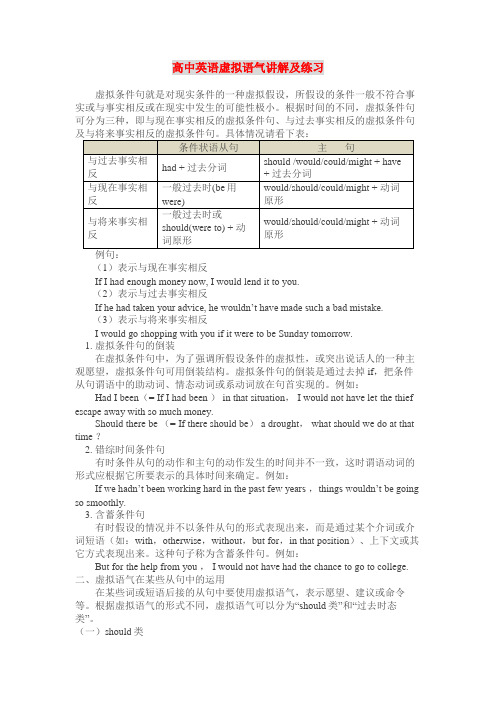
高中英语虚拟语气讲解及练习虚拟条件句就是对现实条件的一种虚拟假设,所假设的条件一般不符合事实或与事实相反或在现实中发生的可能性极小。
根据时间的不同,虚拟条件句可分为三种,即与现在事实相反的虚拟条件句、与过去事实相反的虚拟条件句(1)表示与现在事实相反If I had enough money now, I would lend it to you.(2)表示与过去事实相反If he had taken your advice, he wouldn’t have made such a bad mistake.(3)表示与将来事实相反I would go shopping with you if it were to be Sunday tomorrow.1. 虚拟条件句的倒装在虚拟条件句中,为了强调所假设条件的虚拟性,或突出说话人的一种主观愿望,虚拟条件句可用倒装结构。
虚拟条件句的倒装是通过去掉if,把条件从句谓语中的助动词、情态动词或系动词放在句首实现的。
例如:Had I been(= If I had been ) in that situation, I would not have let the thief escape away with so much money.Should there be (= If there should be) a drought, what should we do at that time ?2. 错综时间条件句有时条件从句的动作和主句的动作发生的时间并不一致,这时谓语动词的形式应根据它所要表示的具体时间来确定。
例如:If we hadn’t been working hard in the past few years ,thing s wouldn’t be going so smoothly.3. 含蓄条件句有时假设的情况并不以条件从句的形式表现出来,而是通过某个介词或介词短语(如:with,otherwise,without,but for,in that position)、上下文或其它方式表现出来。
高中英语虚拟语气讲解及练习题(附答案)

高中英语虚拟语气讲解及练习虚拟条件句就是对现实条件的一种虚拟假设,所假设的条件一般不符合事实或与事实相反或在现实中发生的可能性极小。
根据时间的不同,虚拟条件句可分为三种,即与现在事实相反的虚拟条件句、与过去事实相反的虚拟条件句(1)表示与现在事实相反If I had enough money now, I would lend it to you.(2)表示与过去事实相反If he had taken your advice, he wouldn’t have made such a bad mistake.(3)表示与将来事实相反I would go shopping with you if it were to be Sunday tomorrow.1. 虚拟条件句的倒装在虚拟条件句中,为了强调所假设条件的虚拟性,或突出说话人的一种主观愿望,虚拟条件句可用倒装结构。
虚拟条件句的倒装是通过去掉if,把条件从句谓语中的助动词、情态动词或系动词放在句首实现的。
例如:Had I been(= If I had been ) in that situation, I would not have let the thief escape away with so much money.Should there be (= If there should be) a drought, what should we do at that time ?2. 错综时间条件句有时条件从句的动作和主句的动作发生的时间并不一致,这时谓语动词的形式应根据它所要表示的具体时间来确定。
例如:If we hadn’t been working hard in the past few years ,thing s wouldn’t be going so smoothly.3. 含蓄条件句有时假设的情况并不以条件从句的形式表现出来,而是通过某个介词或介词短语(如:with,otherwise,without,but for,in that position)、上下文或其它方式表现出来。
虚拟语气and倒装(知识点讲解加练习题、答案)
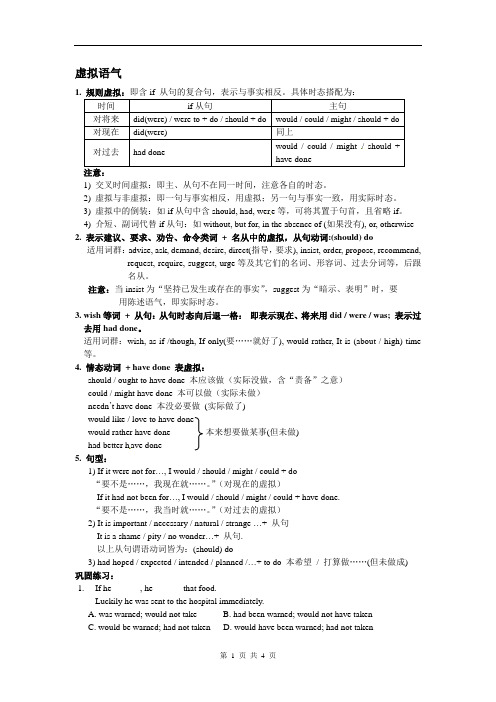
虚拟语气1) 交叉时间虚拟:即主、从句不在同一时间,注意各自的时态。
2) 虚拟与非虚拟:即一句与事实相反,用虚拟;另一句与事实一致,用实际时态。
3) 虚拟中的倒装:如if从句中含should, had, were等,可将其置于句首,且省略if。
4) 介短、副词代替if从句:如without, but for, in the absence of (如果没有), or, otherwise 2. 表示建议、要求、劝告、命令类词+ 名从中的虚拟,从句动词:(should) do适用词群:advise, ask, demand, desire, direct(指导,要求), insist, order, propose, recommend, request, require, suggest, urge等及其它们的名词、形容词、过去分词等,后跟名从。
注意:当insist为“坚持已发生或存在的事实”,suggest为“暗示、表明”时,要用陈述语气,即实际时态。
3. wish等词+ 从句:从句时态向后退一格:即表示现在、将来用did / were / was; 表示过去用had done。
适用词群:wish, as if /though, If only(要……就好了), would rather, It is (about / high) time 等。
4. 情态动词+ have done 表虚拟:should / ought to have done 本应该做(实际没做,含“责备”之意)could / might have done 本可以做(实际未做)needn’t have done 本没必要做(实际做了)would like / love to have donewould rather have done 本来想要做某事(但未做)had better have done5. 句型:1) If it were not for…, I would / should / might / could + do“要不是……,我现在就……。
虚拟语气倒装(讲解+练习)
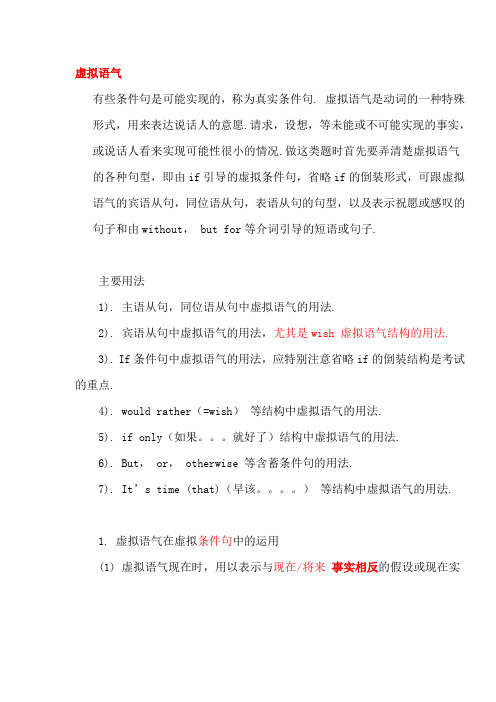
虚拟语气有些条件句是可能实现的,称为真实条件句. 虚拟语气是动词的一种特殊形式,用来表达说话人的意愿.请求,设想,等未能或不可能实现的事实,或说话人看来实现可能性很小的情况.做这类题时首先要弄清楚虚拟语气的各种句型,即由if引导的虚拟条件句,省略if的倒装形式,可跟虚拟语气的宾语从句,同位语从句,表语从句的句型,以及表示祝愿或感叹的句子和由without, but for等介词引导的短语或句子.主要用法1). 主语从句,同位语从句中虚拟语气的用法.2). 宾语从句中虚拟语气的用法,尤其是wish 虚拟语气结构的用法.3). If条件句中虚拟语气的用法,应特别注意省略if的倒装结构是考试的重点.4). would rather(=wish)等结构中虚拟语气的用法.5). if only(如果。
就好了)结构中虚拟语气的用法.6). But, or, otherwise 等含蓄条件句的用法.7). It’s time (that)(早该。
)等结构中虚拟语气的用法.1. 虚拟语气在虚拟条件句中的运用(1) 虚拟语气现在时,用以表示与现在/将来事实相反的假设或现在实现可能性不大的情况.Eg. If I were a bird, I would fly to you.If it is not for their help, we shall be in a very difficult position.If it were not for their help, we should be in a very difficult position.If I had seen the film, I would…..(2) 虚拟语气过去式. 表示与过去事实完全相反的假设.Eg. If we had started earlier, we should not have missed the train.If she hadn’t been ill, she might have come.If she were not ill, she might come.◆书面语中,如果从句里含有should, had, were或其他助动词,则可将从属连词if省去,将助动词.情态动词.be或have放在句首形成部分倒装.Eg.Were he in your position,he’d do the same.If he Were in your position,he’d do the same.Had I had time, I would have done that yesterday.If I Had had time, I would have done that yesterday.If he Should (万一)come tomorrow, I should give him the dictionary.(3) 虚拟语气在某些从句中的应用.A)在(表现了说话人的愿望)wish, suggest, order, demand, propose,command, request, recommend, require, decide, insist, desire,urge等动词的宾语从句(should:应该) + 动词原形.以及would rather /sooner that后要用“ (should:应该) + 动词原形” 来表示愿望,建议,命令,要求等;由上述动词派生或转化的名词suggestion, proposal, plan,motion, recommendation, demand, order, desire, request,requirement, insistence, advice, decision , obligatory(义不容辞的,必须的同位语从句或表语从句中也要用相应的虚拟形式.Eg. His suggestion was that we (should) go at once.Wang insisted that we go at once.B)在It is/was + 某些形容词 + that (表现了说话人的愿望)从句的句型中,that从句中的谓语动词常用虚拟语气,即“should + 动词原形”这些形容词有:important, necessary, essential, imperative, natural, strange,advisable, desirable, possible, probable, astonishing,surprising, desired, suggested, requested, recommended,ordered, proposed, decided, moved等.C) “ should(居然/竟然) + 动词原形(或完成形式)” 可表示惊奇,遗憾,怀疑,不满等.ⅰ. 用于expect, believe, think, suspect 等动词的否定或疑问形式后的宾语从句中.Eg. I never expected that the new apartment should be so small.ⅱ. 用于“It is a pity, it is a shame, it is no wonder 等+ that”等结构后的主语从句中.Eg. It is a pity that he should be so careless.D) 在由for fear that, in case, lest 等引导的状语从句中,用“ should (万一)+ 动词原形” 表示“惟恐”的意思.Eg. He handled the instrument with care for fear that it should be damaged.E) 在“ It is (about/ high ) time + that (从句)(早就应该)” 中,谓语动词常用过去式表表示虚拟语气.Eg. It is high time that Chinese people learnt English.F) 在“as if/ as though”(似乎/好像) 引导的状语从句中,谓语动词与wish的宾语从句的虚拟形式相同.Eg. He w ork s with such enthusiasm as if he never knew fatigue. He speaks English as though he were an American.G) 在 look/sound/feel/ seem + as if / as though从句中,当表示真实情况时,用陈述语气; 否则,用虚拟语气.Eg.It seems as if they know each other. (真实情况)It seems as if they knew each other.It seems as though it were already spring. (虚拟语气)H) 用在if only(如果。
高中英语 虚拟语气讲解及练习(有答案)
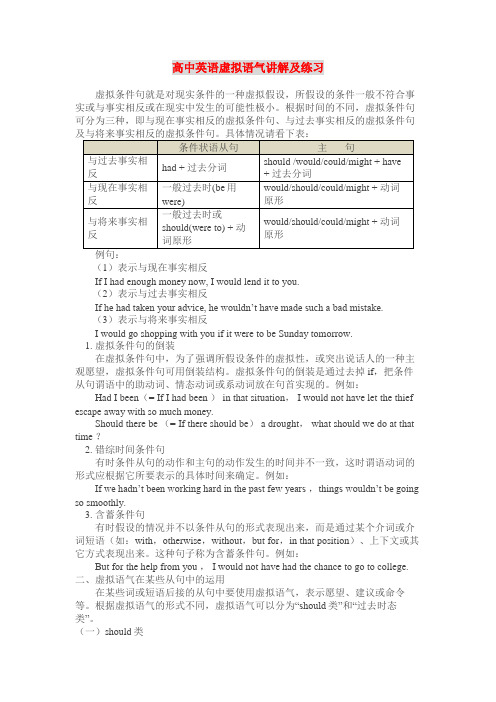
高中英语虚拟语气讲解及练习虚拟条件句就是对现实条件的一种虚拟假设,所假设的条件一般不符合事实或与事实相反或在现实中发生的可能性极小。
根据时间的不同,虚拟条件句可分为三种,即与现在事实相反的虚拟条件句、与过去事实相反的虚拟条件句(1)表示与现在事实相反If I had enough money now, I would lend it to you.(2)表示与过去事实相反If he had taken your advice, he wouldn’t have made such a bad mistake.(3)表示与将来事实相反I would go shopping with you if it were to be Sunday tomorrow.1. 虚拟条件句的倒装在虚拟条件句中,为了强调所假设条件的虚拟性,或突出说话人的一种主观愿望,虚拟条件句可用倒装结构。
虚拟条件句的倒装是通过去掉if,把条件从句谓语中的助动词、情态动词或系动词放在句首实现的。
例如:Had I been(= If I had been ) in that situation, I would not have let the thief escape away with so much money.Should there be (= If there should be) a drought, what should we do at that time ?2. 错综时间条件句有时条件从句的动作和主句的动作发生的时间并不一致,这时谓语动词的形式应根据它所要表示的具体时间来确定。
例如:If we hadn’t been working hard in the past few years ,thing s wouldn’t be going so smoothly.3. 含蓄条件句有时假设的情况并不以条件从句的形式表现出来,而是通过某个介词或介词短语(如:with,otherwise,without,but for,in that position)、上下文或其它方式表现出来。
高中英语虚拟语气讲解及练习题(附答案)

高中英语虚拟语气讲解及练习虚拟条件句就是对现实条件的一种虚拟假设,所假设的条件一般不符合事实或与事实相反或在现实中发生的可能性极小。
根据时间的不同,虚拟条件句可分为三种,即与现在事实相反的虚拟条件句、与过去事实相反的虚拟条件句(1)表示与现在事实相反If I had enough money now, I would lend it to you.(2)表示与过去事实相反If he had taken your advice, he wouldn’t have made such a bad mistake.(3)表示与将来事实相反I would go shopping with you if it were to be Sunday tomorrow.1. 虚拟条件句的倒装在虚拟条件句中,为了强调所假设条件的虚拟性,或突出说话人的一种主观愿望,虚拟条件句可用倒装结构。
虚拟条件句的倒装是通过去掉if,把条件从句谓语中的助动词、情态动词或系动词放在句首实现的。
例如:Had I been(= If I had been ) in that situation, I would not have let the thief escape away with so much money.Should there be (= If there should be) a drought, what should we do at that time ?2. 错综时间条件句有时条件从句的动作和主句的动作发生的时间并不一致,这时谓语动词的形式应根据它所要表示的具体时间来确定。
例如:If we hadn’t been working hard in the past few years ,thing s wouldn’t be going so smoothly.3. 含蓄条件句有时假设的情况并不以条件从句的形式表现出来,而是通过某个介词或介词短语(如:with,otherwise,without,but for,in that position)、上下文或其它方式表现出来。
英语语法专项:虚拟语气用法详解及练习(附答案)

高中英语虚拟语气讲解及练习虚拟条件句就是对现实条件的一种虚拟假设,所假设的条件一般不符合事实或与事实相反或在现实中发生的可能性极小。
根据时间的不同,虚拟条件句可分为三种,即与现在事实相反的虚拟条件句、与过去事实相反的虚拟条件句(1)表示与现在事实相反If I had enough money now, I would lend it to you.(2)表示与过去事实相反If he had taken your advice, he wouldn’t have made such a bad mistake.(3)表示与将来事实相反I would go shopping with you if it were to be Sunday tomorrow.1. 虚拟条件句的倒装在虚拟条件句中,为了强调所假设条件的虚拟性,或突出说话人的一种主观愿望,虚拟条件句可用倒装结构。
虚拟条件句的倒装是通过去掉if,把条件从句谓语中的助动词、情态动词或系动词放在句首实现的。
例如:Had I been(= If I had been ) in that situation, I would not have let the thief escape away with so much money.Should there be (= If there should be) a drought, what should we do at that time ?2. 错综时间条件句有时条件从句的动作和主句的动作发生的时间并不一致,这时谓语动词的形式应根据它所要表示的具体时间来确定。
例如:If we hadn’t been working hard in the past few years ,thing s wouldn’t be going so smoothly.3. 含蓄条件句有时假设的情况并不以条件从句的形式表现出来,而是通过某个介词或介词短语(如:with,otherwise,without,but for,in that position)、上下文或其它方式表现出来。
高中英语虚拟语气讲解及练习题(附答案)
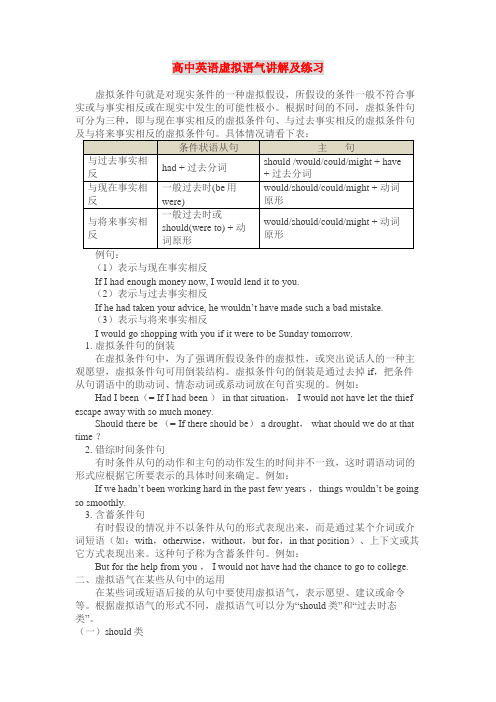
高中英语虚拟语气讲解及练习虚拟条件句就是对现实条件的一种虚拟假设,所假设的条件一般不符合事实或与事实相反或在现实中发生的可能性极小。
根据时间的不同,虚拟条件句可分为三种,即与现在事实相反的虚拟条件句、与过去事实相反的虚拟条件句(1)表示与现在事实相反If I had enough money now, I would lend it to you.(2)表示与过去事实相反If he had taken your advice, he wouldn’t have made such a bad mistake.(3)表示与将来事实相反I would go shopping with you if it were to be Sunday tomorrow.1. 虚拟条件句的倒装在虚拟条件句中,为了强调所假设条件的虚拟性,或突出说话人的一种主观愿望,虚拟条件句可用倒装结构。
虚拟条件句的倒装是通过去掉if,把条件从句谓语中的助动词、情态动词或系动词放在句首实现的。
例如:Had I been(= If I had been ) in that situation, I would not have let the thief escape away with so much money.Should there be (= If there should be) a drought, what should we do at that time ?2. 错综时间条件句有时条件从句的动作和主句的动作发生的时间并不一致,这时谓语动词的形式应根据它所要表示的具体时间来确定。
例如:If we hadn’t been working hard in the past few years ,thing s wouldn’t be going so smoothly.3. 含蓄条件句有时假设的情况并不以条件从句的形式表现出来,而是通过某个介词或介词短语(如:with,otherwise,without,but for,in that position)、上下文或其它方式表现出来。
2022年高考英语虚拟语气讲解及练习题(附答案)

高中英语虚拟语气讲解及练习虚拟条件句就是对现实条件的一种虚拟假设,所假设的条件一般不符合事实或与事实相反或在现实中发生的可能性极小。
根据时间的不同,虚拟条件句可分为三种,即与现在事实相反的虚拟条件句、与过去事实相反的虚拟条件句(1)表示与现在事实相反If I had enough money now, I would lend it to you.(2)表示与过去事实相反If he had taken your advice, he wouldn’t have made such a bad mistake.(3)表示与将来事实相反I would go shopping with you if it were to be Sunday tomorrow.1. 虚拟条件句的倒装在虚拟条件句中,为了强调所假设条件的虚拟性,或突出说话人的一种主观愿望,虚拟条件句可用倒装结构。
虚拟条件句的倒装是通过去掉if,把条件从句谓语中的助动词、情态动词或系动词放在句首实现的。
例如:Had I been(= If I had been ) in that situation, I would not have let the thief escape away with so much money.Should there be (= If there should be) a drought, what should we do at that time ?2. 错综时间条件句有时条件从句的动作和主句的动作发生的时间并不一致,这时谓语动词的形式应根据它所要表示的具体时间来确定。
例如:If we hadn’t been working hard in the past few years ,thing s wouldn’t be going so smoothly.3. 含蓄条件句有时假设的情况并不以条件从句的形式表现出来,而是通过某个介词或介词短语(如:with,otherwise,without,but for,in that position)、上下文或其它方式表现出来。
虚拟语气详细讲解及经典习题 附答案
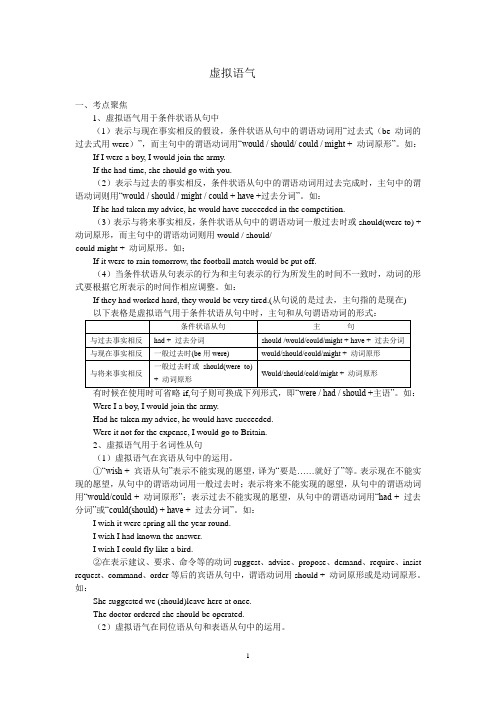
虚拟语气一、考点聚焦1、虚拟语气用于条件状语从句中(1)表示与现在事实相反的假设,条件状语从句中的谓语动词用“过去式(be动词的过去式用were)”,而主句中的谓语动词用“would / should/ could / might + 动词原形”。
如:If I were a boy, I would join the army.If the had time, she should go with you.(2)表示与过去的事实相反,条件状语从句中的谓语动词用过去完成时,主句中的谓语动词则用“would / should / might / could + have +过去分词”。
如:If he had taken my advice, he would have succeeded in the competition.(3)表示与将来事实相反,条件状语从句中的谓语动词一般过去时或should(were to) + 动词原形,而主句中的谓语动词则用would / should/could might + 动词原形。
如;If it were to rain tomorrow, the football match would be put off.(4)当条件状语从句表示的行为和主句表示的行为所发生的时间不一致时,动词的形式要根据它所表示的时间作相应调整。
如:If they had worked hard, they would be very tired.(从句说的是过去,主句指的是现在)Were I a boy, I would join the army.Had he taken my advice, he would have succeeded.Were it not for the expense, I would go to Britain.2、虚拟语气用于名词性从句(1)虚拟语气在宾语从句中的运用。
(完整版)虚拟语气讲解及练习题(含答案和解释)

(完整版)虚拟语气讲解及练习题(含答案和解释)虚拟语气讲解与练习黄志刚2013.10.一. 简介虚拟语气用来表示说话人的主观愿望或假想,而不表示客观存在的事实,所说的是一个条件,不一定是事实,或与事实相反。
虚拟语气通过谓语动词的特殊形式来表示。
英语中的语气分为陈述语气、祈使语气、虚拟语气在什么情况下用虚拟语气? 在表示虚假的、与事实相反的或难以实现的情况时用虚拟语气,表示主观愿望或表示某种强烈情感时,也用虚拟语气。
即当一个人说话时欲强调其所说的话是基于自己的主观想法,而不是根据客观实际,就用虚拟语气。
二. 虚拟语气在非真实条件状语从句中的用法1、真实条件状语从句与非真实条件状语从句真:eg . If he doesn’t hurry up, he will miss the bus. 如果他不快点,他将错过巴士。
( 真实条件状语)(不是虚拟语气)If he is free, he will ask me to tell stories. 如果他是空闲的,他会要求我讲故事。
(真实条件状语)(不是虚拟语气)非真:eg. If I were you, I would go at once.如果我是你,我马上就会去。
(非真实条件状语从句)If there were no air, people would die. 如果没有空气,人就会死亡。
(非真实条件状语从句)2、用法及动词形式1、表示与现在事实相反的情况,例1.If I were you, I would take an umbrella.如果我是你,我会带把伞。
(事实:我不可能是你) 2.If I knew his telephone number, I would tell you. 如果我知道他的电话号码,我就会告诉你。
(事实:不知道) 3.If there were no air orwater, there would be no living things on the earth. 如果没有水和空气,地球上就不会有生物。
高中英语虚拟语气讲解及练习附答案

高中英语虚拟语气讲解及练习虚拟条件句就是对现实条件的一种虚拟假设,所假设的条件一般不符合事实或与事实相反或在现实中发生的可能性极小。
根据时间的不同,虚拟条件句可分为三种,即与现在事实相反的虚拟条件句、与过去事实相反的虚拟条件句(1)表示与现在事实相反If I had enough money now, I would lend it to you.(2)表示与过去事实相反If he had taken your advice, he wouldn’t have made such a bad mistake.(3)表示与将来事实相反I would go shopping with you if it were to be Sunday tomorrow.1. 虚拟条件句的倒装在虚拟条件句中,为了强调所假设条件的虚拟性,或突出说话人的一种主观愿望,虚拟条件句可用倒装结构。
虚拟条件句的倒装是通过去掉if,把条件从句谓语中的助动词、情态动词或系动词放在句首实现的。
例如:Had I been(= If I had been ) in that situation, I would not have let the thief escape away with so much money.Should there be (= If there should be) a drought, what should we do at that time ?2. 错综时间条件句有时条件从句的动作和主句的动作发生的时间并不一致,这时谓语动词的形式应根据它所要表示的具体时间来确定。
例如:If we hadn’t been working hard in the past few years ,thing s wouldn’t be going so smoothly.3. 含蓄条件句有时假设的情况并不以条件从句的形式表现出来,而是通过某个介词或介词短语(如:with,otherwise,without,but for,in that position)、上下文或其它方式表现出来。
2022年高考英语虚拟语气讲解及练习题(附答案)

高中英语虚拟语气讲解及练习虚拟条件句就是对现实条件的一种虚拟假设,所假设的条件一般不符合事实或与事实相反或在现实中发生的可能性极小。
根据时间的不同,虚拟条件句可分为三种,即与现在事实相反的虚拟条件句、与过去事实相反的虚拟条件句(1)表示与现在事实相反If I had enough money now, I would lend it to you.(2)表示与过去事实相反If he had taken your advice, he wouldn’t have made such a bad mistake.(3)表示与将来事实相反I would go shopping with you if it were to be Sunday tomorrow.1. 虚拟条件句的倒装在虚拟条件句中,为了强调所假设条件的虚拟性,或突出说话人的一种主观愿望,虚拟条件句可用倒装结构。
虚拟条件句的倒装是通过去掉if,把条件从句谓语中的助动词、情态动词或系动词放在句首实现的。
例如:Had I been(= If I had been ) in that situation, I would not have let the thief escape away with so much money.Should there be (= If there should be) a drought, what should we do at that time ?2. 错综时间条件句有时条件从句的动作和主句的动作发生的时间并不一致,这时谓语动词的形式应根据它所要表示的具体时间来确定。
例如:If we hadn’t been working hard in the past few years ,thing s wouldn’t be going so smoothly.3. 含蓄条件句有时假设的情况并不以条件从句的形式表现出来,而是通过某个介词或介词短语(如:with,otherwise,without,but for,in that position)、上下文或其它方式表现出来。
2011高考英语虚拟语气讲解及习题(附答案)

虚拟语气虚拟语气是通过特殊的谓语动词形式来表达的愿望、假设、怀疑、猜测或建议等语气,它不表示客观存在。
一、虚拟语气在单句中的用法常用来表示祝愿、采用固定的倒装句式。
例如:Long live the People´s Republic of China!中华人民共和国万岁!May you be happy!May you have a good time!二、虚拟语气在复合句中的用法:1.在非真实性条件句与主句中的用法1)表示与现在事实相反例如:If I were you,I should accept the invitation.如果我是你,我会接受邀请的。
If I had time,I would go there.如果我有空,我就去那儿。
2)与过去事实相反例如:If you had come earlier,you couldn´t/wouldn´t have missed the bus.如果你早点来,你就不会错过那辆公共汽车了。
If he had seen you yesterday,he would have returned your book.如果他昨天见到了你,他就会还你的书的。
3)与将来事实可能相反例如:If it should rain/were to rain/rained tomorrow,the sports meet would beput off.万一明天下雨,运动会就推迟。
(事实上明天下雨的可能性不大。
)If you dropped/should drop/were to drop the glass,it would break.万一杯子掉下来会打碎的。
4) if的省略如果条件句中有were,had,should 等助动词,可将if省略,而把were,had或should置于句首,来表达以if引导的条件句的相同意思。
例如:Should it rain/were it to rain tomorrow,the sports meet would be put off./Had he seen you yesterday,he would have returned your book.5)条件句或主句的省略当有上下文或上下句中的语言环境暗示的时候,表示虚拟语气的从句或主句往往可以省略,以避免重复。
英语语法专项:虚拟语气用法详解及练习(附答案)

英语语法专项:虚拟语⽓⽤法详解及练习(附答案)虚拟语⽓⽤法详解⼀、条件句中的虚拟语⽓1. 条件句中虚拟语⽓的形式从句中提出⼀种与客观现实不相符或根本不可能存在的条件,主句会产⽣的⼀种不可能获得的结果。
条件句中(1) 将来时的条件句中的虚拟语⽓。
如:If he should go to Qing Hua University, he would make full use of his time. 如果他要上清华⼤学的话,他就会充分利⽤他的时间了。
If he were to come here, he would tell us about it. 如果他要来的话,他会通知我们⼀声。
(2) 现在时的条件句中的虚拟语⽓。
如:If he were free, he would help us. 要是他有空的话,它会帮助我们的。
If he studied at this school, he would know you well. 如果他在这所学校学习的话,它会对你很熟悉。
(3)过去时的条件句中的虚拟语⽓。
如:If I had seen the film, I would have told you about it. 我如果看过这场电影,我会把电影内容告诉你了。
If I had got there earlier, I would have met Mr. Li. 如果我早点到那⼉,我就会会到了李先⽣。
3. 运⽤条件句中的虚拟语⽓时,须注意的⼏个问题(1)当从句的主语为第三⼈称单数时,谓语动词若是系动词be时,可⽤was 代替were。
但在倒装虚拟结构及if I were you, as it were 中,只能⽤were。
如:Were I ten years younger, I would study abroad. 要是我还年轻⼗岁的话,我会去国外学习。
If I were you, I would try my best to grasp the chance. 要是我是你的话,我要尽⼒抓住这次机会。
虚拟语气讲解及练习题(含答案和解释)

高中英语虚拟语气讲解及练习虚拟条件句就是对现实条件的一种虚拟假设,所假设的条件一般不符合事实或与事实相反或在现实中发生的可能性极小。
根据时间的不同,虚拟条件句可分为三种,即与现在事实相反的虚拟条件句、与过去事实相反的虚拟条件句(1)表示与现在事实相反If I had enough money now, I would lend it to you.(2)表示与过去事实相反If he had taken your advice, he wouldn’t have made such a bad mistake.(3)表示与将来事实相反I would go shopping with you if it were to be Sunday tomorrow.1. 虚拟条件句的倒装在虚拟条件句中,为了强调所假设条件的虚拟性,或突出说话人的一种主观愿望,虚拟条件句可用倒装结构。
虚拟条件句的倒装是通过去掉if,把条件从句谓语中的助动词、情态动词或系动词放在句首实现的。
例如:Had I been(= If I had been ) in that situation, I would not have let the thief escape away with so much money.Should there be (= If there should be) a drought, what should we do at that time ?2. 错综时间条件句有时条件从句的动作和主句的动作发生的时间并不一致,这时谓语动词的形式应根据它所要表示的具体时间来确定。
例如:If we hadn’t been working hard in the past few years ,thing s wouldn’t be going so smoothly.3. 含蓄条件句有时假设的情况并不以条件从句的形式表现出来,而是通过某个介词或介词短语(如:with,otherwise,without,but for,in that position)、上下文或其它方式表现出来。
高中虚拟语气的讲解+练习+详解

高中英语虚拟语气讲解及练习虚拟条件句就是对现实条件的一种虚拟假设,所假设的条件一般不符合事实或与事实相反或在现实中发生的可能性极小。
根据时间的不同,虚拟条件句可分为三种,即与现在事实相反的虚拟条件句、与过去事实相反的虚拟条件句(1)表示与现在事实相反If I had enough money now, I would lend it to you.(2)表示与过去事实相反If he had taken your advice, he wouldn’t have made such a bad mistake.(3)表示与将来事实相反I would go shopping with you if it were to be Sunday tomorrow.1. 虚拟条件句的倒装在虚拟条件句中,为了强调所假设条件的虚拟性,或突出说话人的一种主观愿望,虚拟条件句可用倒装结构。
虚拟条件句的倒装是通过去掉if,把条件从句谓语中的助动词、情态动词或系动词放在句首实现的。
例如:Had I been(= If I had been ) in that situation, I would not have let the thief escape away with so much money.Should there be (= If there should be) a drought, what should we do at that time ?2. 错综时间条件句有时条件从句的动作和主句的动作发生的时间并不一致,这时谓语动词的形式应根据它所要表示的具体时间来确定。
例如:If we hadn’t been working hard in the past few years ,thing s wouldn’t be going so smoothly.3. 含蓄条件句有时假设的情况并不以条件从句的形式表现出来,而是通过某个介词或介词短语(如:with,otherwise,without,but for,in that position)、上下文或其它方式表现出来。
虚拟语气讲解及练习(有答案)
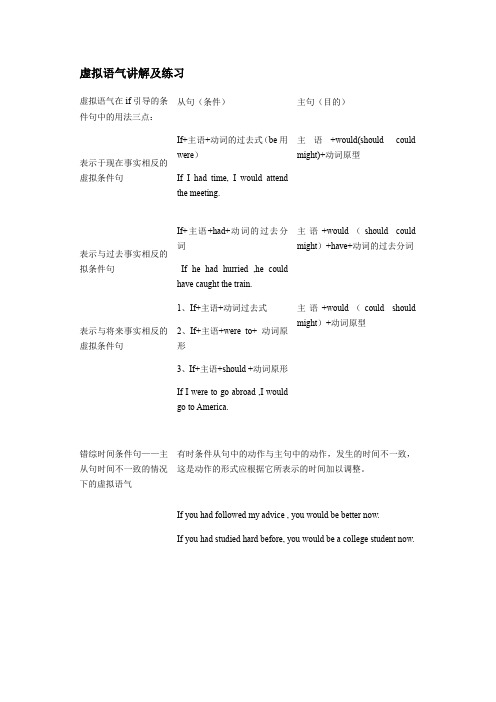
虚拟语气讲解及练习虚拟语气在if引导的条件句中的用法三点:从句(条件)主句(目的)表示于现在事实相反的虚拟条件句If+主语+动词的过去式(be用were)If I had time, I would attendthe meeting.主语+would(should couldmight)+动词原型表示与过去事实相反的拟条件句If+主语+had+动词的过去分词If he had hurried ,he couldhave caught the train.主语+would(should couldmight)+have+动词的过去分词表示与将来事实相反的虚拟条件句1、If+主语+动词过去式2、If+主语+were to+ 动词原形3、If+主语+should +动词原形If I were to go abroad ,I wouldgo to America.主语+would(could shouldmight)+动词原型错综时间条件句——主从句时间不一致的情况下的虚拟语气有时条件从句中的动作与主句中的动作,发生的时间不一致,这是动作的形式应根据它所表示的时间加以调整。
If you had followed my advice , you would be better now.If you had studied hard before, you would be a college student now.though引导的方式状语从句中表示与将来事实相反,(表示将来的可能性不大),用would (might, could)+动词原形He acts as if he could win in the game .注意:1.在as if/as though 句中,如果有可能成为事实,用陈述语气。
例:He looks as if he going to be ill.2.as though或as if引导的状语从句,从句主语和主句主语相同时,从句中可省略主语和部分谓语。
词汇与语法第5讲(虚拟语气-倒装句)

建议学习者深入理解虚拟语气倒装句的规则和用法,掌握其基本结构 和变化规律。
多加练习
通过大量的练习和实践,逐渐熟悉和掌握虚拟语气倒装句的使用,提 高运用语言的准确性。
关注语境
注意在不同的语境下选择合适的虚拟语气倒装句,以更好地表达意思 和情感。
持续学习
随着语言的发展,虚拟语气倒装句的用法和规则也在不断变化。建议 学习者保持持续学习的态度,关注语言的新变化和发展趋势。
第二类虚拟语气倒装句
用于表达与现在事实相反的情况。例 如:If I were you, I would go to the party.
虚拟语气倒装句的用法
用于表达假设、想象或虚构的情 况,强调与实际情况的对比。
ቤተ መጻሕፍቲ ባይዱ
在文学、诗歌、戏剧等艺术作品 中,虚拟语气倒装句常常被用来
增强语言的表现力和感染力。
在科学、法律、政治等正式文体 中,虚拟语气倒装句也常被用来 表达假设或推测的情况,增强语
在虚拟语气倒装句中,通常使用助动 词did、were等代替正常语序中的谓 语动词。
虚拟语气倒装句的分类
第一类虚拟语气倒装句
第三类虚拟语气倒装句
用于表达与过去事实相反的情况。例 如:If I had known the answer, I would have told you.
用于表达与将来事实相反的情况。例 如:If it were to rain tomorrow, we would stay at home.
言的严谨性和说服力。
03
虚拟语气倒装句的构成
虚拟语气倒装句的构成方式
主语倒装
将主语放在谓语动词之前, 表示强调或突出主语。
谓语倒装
将谓语放在主语之后,表 示强调或突出谓语。
- 1、下载文档前请自行甄别文档内容的完整性,平台不提供额外的编辑、内容补充、找答案等附加服务。
- 2、"仅部分预览"的文档,不可在线预览部分如存在完整性等问题,可反馈申请退款(可完整预览的文档不适用该条件!)。
- 3、如文档侵犯您的权益,请联系客服反馈,我们会尽快为您处理(人工客服工作时间:9:00-18:30)。
虚拟语气有些条件句是可能实现的,称为真实条件句. 虚拟语气是动词的一种特殊形式,用来表达说话人的意愿.请求,设想,等未能或不可能实现的事实,或说话人看来实现可能性很小的情况.做这类题时首先要弄清楚虚拟语气的各种句型,即由if引导的虚拟条件句,省略if的倒装形式,可跟虚拟语气的宾语从句,同位语从句,表语从句的句型,以及表示祝愿或感叹的句子和由without, but for等介词引导的短语或句子.主要用法1). 主语从句,同位语从句中虚拟语气的用法.2). 宾语从句中虚拟语气的用法,尤其是wish 虚拟语气结构的用法.3). If条件句中虚拟语气的用法,应特别注意省略if的倒装结构是考试的重点.4). would rather(=wish)等结构中虚拟语气的用法.5). if only(如果。
就好了)结构中虚拟语气的用法.6). But, or, otherwise 等含蓄条件句的用法.7). It’s time (that)(早该。
)等结构中虚拟语气的用法.1. 虚拟语气在虚拟条件句中的运用(1) 虚拟语气现在时,用以表示与现在/将来事实相反的假设或现在实现可能性不大的情况.Eg. If I were a bird, I would fly to you.If it is not for their help, we shall be in a very difficult position.If it were not for their help, we should be in a very difficult position.If I had seen the film, I would…..(2) 虚拟语气过去式. 表示与过去事实完全相反的假设.Eg. If we had started earlier, we should not have missed the train.If she hadn’t been ill, she might have come.If she were not ill, she might come.◆书面语中,如果从句里含有should, had, were或其他助动词,则可将从属连词if省去,将助动词.情态动词.be或have放在句首形成部分倒装.Eg.Were he in your position,he’d do the same.If he Were in your position,he’d do the same.Had I had time, I would have done that yesterday.If I Had had time, I would have done that yesterday.If he Should (万一)come tomorrow, I should give him the dictionary.(3) 虚拟语气在某些从句中的应用.A)在(表现了说话人的愿望)wish, suggest, order, demand, propose,command, request, recommend, require, decide, insist, desire,urge等动词的宾语从句(should:应该) + 动词原形.以及would rather /sooner that后要用“ (should:应该) + 动词原形” 来表示愿望,建议,命令,要求等;由上述动词派生或转化的名词suggestion, proposal, plan,motion, recommendation, demand, order, desire, request,requirement, insistence, advice, decision , obligatory(义不容辞的,必须的同位语从句或表语从句中也要用相应的虚拟形式.Eg. His suggestion was that we (should) go at once.Wang insisted that we go at once.B)在It is/was + 某些形容词 + that (表现了说话人的愿望)从句的句型中,that从句中的谓语动词常用虚拟语气,即“should + 动词原形”这些形容词有:important, necessary, essential, imperative, natural, strange,advisable, desirable, possible, probable, astonishing,surprising, desired, suggested, requested, recommended,ordered, proposed, decided, moved等.C) “ should(居然/竟然) + 动词原形(或完成形式)” 可表示惊奇,遗憾,怀疑,不满等.ⅰ. 用于expect, believe, think, suspect 等动词的否定或疑问形式后的宾语从句中.Eg. I never expected that the new apartment should be so small.ⅱ. 用于“It is a pity, it is a shame, it is no wonder 等+ that”等结构后的主语从句中.Eg. It is a pity that he should be so careless.D) 在由for fear that, in case, lest 等引导的状语从句中,用“ should (万一)+ 动词原形” 表示“惟恐”的意思.Eg. He handled the instrument with care for fear that it should be damaged.E) 在“ It is (about/ high ) time + that (从句)(早就应该)” 中,谓语动词常用过去式表表示虚拟语气.Eg. It is high time that Chinese people learnt English.F) 在“as if/ as though”(似乎/好像) 引导的状语从句中,谓语动词与wish的宾语从句的虚拟形式相同.Eg. He w ork s with such enthusiasm as if he never knew fatigue. He speaks English as though he were an American.G) 在 look/sound/feel/ seem + as if / as though从句中,当表示真实情况时,用陈述语气; 否则,用虚拟语气.Eg.It seems as if they know each other. (真实情况)It seems as if they knew each other.It seems as though it were already spring. (虚拟语气)H) 用在if only(如果。
就好了)引起的感叹句中.Eg. If only the driver didn’t drive so fast!虚拟语气: 1)假设类:过去时;2)愿望类:(should) + 动词原形1. If I ____ where he lived,I ____ a note to him.A. knew,wouldB. had known,would have sentC. know,would sendD. knew,would have sent2. If they ____ earlier than expected,they ____ here now.A. h ad started,would beB. started,might beC. had started,would have beenD. will start,might have been3. I didn't know his telephone number. ____ it,I ____ then.A. Had I known,would ring him upB. Should I know,would have rung him upC. If I knew;would ring him upD. Had I known;would have rung him up4. Mary is ill today. If she _____,she ____ absent from school.A. were not ill,wouldn't beB. had been ill,wouldn't have beenC. had been ill,should have beenD. hadn't been ill,could be5. Were I to do it,I ________ it some other way.A. will doB. would doC. would have doneD. were to do1~5 BADAB6. I ________ him the answer ________ possible,but I was so busy then.A. could tell,if it had beenB. must have told,were itC. should have told,had it beenD. should have told,should it be7. Without your help,we________ so much.A. won't achieveB. didn't achieveC. don't achieveD. wouldn't have achieved8. You didn't take his advice. ________ his advice,you ________ such a mistake.A. Had you taken,wouldn't have madeB. If you had taken,would makeC. Were you lo take,shouldn't have madeD. Have you taken,won't have made9. We wish we ____ what you did when we were at high school.A. didB. could have doneC. have doneD. should do10. She wishes she ____ to the theatre last night.A. wentB. would goC. had goneD. were going6~10 CDABC11. Tom is very short now. His mother wishes that he ________ be tall when he grows up.A. couldB. shouldC. wouldD. were able to12. My sister advised me that I ________ accept the invitation.A. couldB. mustC. shouldD. might13. He asks that he ________ an opportunity to explain why he's refused to go there.A. is givenB. must giveC. should giveD. be given14. Do you think of Wang Fang's suggestion that he ________ Mr. Li to the party?A. will inviteB. have invitedC. is invitedD. invite15. I insisted that he ________ at once.A. be goneB. goC. would goD. might go11~15 CCDDB16. Li Ming insisted that he ________ anything at all.A. hadn't stolenB. shouldn't stealC. doesn't stealD. steal17. It i s quite natural that my coming late again ________ them very angry.A. had madeB. would makeC. makesD. m ake18. He acts as if he ________ everything in the world.A. knewB. knowsC. has knownD. won't know19. Read it aloud so that I ________ you clearly.A. may hearB. will hearC. hearD. have heard20. They got up early in order that they ________ they first train.A. caughtB. will catchC. might catchD. shall catch16~20 ADAAC21. I am sorry that he ________ in such poor health.A. areB. shall beC. wereD. should be22. That is a good book. You ________ it yesterday.A. could buyB. should buyC. should have boughtD. bought23. It is high time we ________ home.A. will goB. would goC. have goneD. went24. I'd rather that you ________ home.A. wentB. have goneC. will goD. had gone21~25 DCDAD 26~30 BDDAA25. If only I _________ to the lecture!A. li stenB. will listenC. am listeningD. had listened26. —— If he_____,he ______ that food.---- Luckily he was sent to the hospital immediately.A. was warned,would not takeB. had been warned,would not have takenC. would be warned,had not takenD. would have been warned,had not taken27. I didn't see your sister at the meeting. If she _________,she would have met my brother.A. has comeB. did comeC. cameD. had come28. Without electricity,human life ________ quite different today.A. isB. will beC. would have beenD. would be29. He ________ you more help,even though he was very busy.A. might have givenB. might giveC. may have givenD. may give30. If city noises _______ from increasing,people _______ shout to be heard even at the dinner table 20 years from now.A. are not kept,will have toB. are not kept,have toC. do not keep,will have toD. do not keep,have to31~35 DABBD31. Mike's father,as well as his mother,insisted that he________ home.A. stayedB. could stayC. has stayedD. stay32. Mr. Smith insisted that he ________ the work all.A. had doneB. have doneC. didD. so33. Jane would never have gone to the party ________ that Mary would come to see her.A. has she knownB. had she knownC. if she knowD. if she has known34. If you had enough money,what ________?A. will you buyB. would you buyC. would you have boughtD. will you have bought35. If you ________ that film late last night,you wouldn't be so sleepy.A. didn't seeB. haven't seenC. wouldn't have seenD. hadn't seen36. Our monitor requested that ________.A. all the class studied more carefully the problemB. the problem was more carefully studiedC. with great care the problem could be studiedD. all the class study the problem more carefully37. —— Would you have called her up had it been possible?Yes, but I ________ busy doing my homework.A. wasB. wereC. had beenD. would be38. His tired face suggested that he ________ really tired after thelong walk.A. had beenB. wasC. beD. should be39. It is important that we ________.A. shall close the window before we leaveB. will close the window before we leaveC. must close the window before we leaveD. close the window before we leave40. I didn't know his telephone number,otherwise I ______ him.A. had telephonedB. would telephoneC. would have telephonedD. telephone参考答案1~5 BADAB 6~10 CDABC 11~15 CCDDB 16~20 ADAAC 21~25 DCDAD 26~30 BDDAA31~35 DABBD 36~40 DABDC倒装1.以neither, nor 或so开头的句子或分句,通常用倒装。
